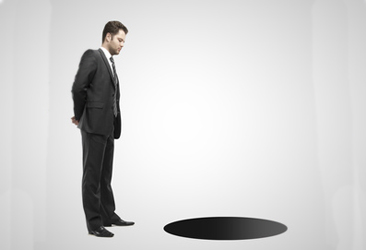
Watch Out For Think-Holes
 Answer to last month’s question: Change the “head of the fish” to balance benefit as well as cost. Example: “Why does internal service impact profitability?
Answer to last month’s question: Change the “head of the fish” to balance benefit as well as cost. Example: “Why does internal service impact profitability?
Most of us have a pretty high opinion of our own thinking*. We are biased, but don’t see it that way. This makes complete sense. WE are ALIVE**. We are the latest survivors of billions of years of disaster, uncertainty, death and taxes***. We are the WINNERS! We must be doing something right. Right?
Right! As survivors, we have tremendous adaptations. Adaptations that got our ancestors away from lions and tigers and bears oh my!**** These adaptations are less useful than they used to be – see if you agree.
Fast thinking vs. slow thinking:
We have almost instantaneous abilities to recognize friends, spot strangers, see (and dodge) dangers, identify objects and their uses, feel body language, judge tone of voice and much, much more. The Nobel Prize winning economist Daniel Kahneman describes these abilities as System 1 thinking.
Here is an example of System 1 thinking:
What is this picture?

Here is an example of System 2 thinking:
If the average expenditure by a middle class consumer ($50K-$115K/year) at a SaveMoreBySpendingMore™ store is $18.25, and middle class consumers represent 94% of SMBSM customers in 2012, and our total customer visits per year in 2012 were 78,543,228, how much revenue came from middle class customers? *****
If the above seems excessive as an example, try this example of “slow” thinking (for most of us):
How much is (40 x 52) – 80?
Even though we “know” we can calculate the above fairly quickly, and we have a sense that the answer is not 17, or 15,000,000, we (I mean I, as my brilliant readers are not so limited) cannot calculate it as quickly as we can recognize a $100 bill.
The “thinkhole” here is the temptation to go with “first intuition” when it is not always the best approach. This can be appropriate (“Duck – here comes a rock!”), it can also be less (way less) than useful (“Let’s build a really cool space airplane just like the astronauts/pilots always wanted. That will be cheap, reliable and fun, just like flying jets.”). One way to characterize a BA is as a person who is willing to do the complex thinking for a larger group.
Anytime a complex decision is offered to a meeting, there is a real danger of the decision being made “quickly”, and almost surely “wrongly”. In such situations we must be ready with clear options and open facilitation to keep discussion (and follow up analysis) alive.
Some of you may recall the training video “Going to Abilene”, where a bunch of IBM trainees decide to go to Abilene after one of them tosses it out as an idea. They have a miserable, hot, dusty day and only get 1 hour in Abilene for their trouble. When they get back to training camp, they argue and place blame until they realize what happened. They went to Abilene because no one wanted to “contradict” their colleague or “put down” the idea. The colleague who suggested Abilene was quite clear. “Don’t blame me! It was just a thought. I didn’t think it was the greatest thought in the world, but when everyone went along I didn’t want to stand out!”
Solution: Do the slow thinking. Don’t force decisions. Simplify for the audience.
Let’s look at some other thinkholes:
Aversion to Loss will prevent Desirable Strategies for Gain
Would you rather have a 100% chance at $1000, or a 90% chance at $1200 with a 10% chance of losing $50? Why? What if you get to play 10 times in a row? It is difficult to overcome fear of loss. The loss can be intangible – reputation, comfort, preference, etc. These fears can actually prevent our work as change agents.
Solution: Do the “math” so all can see the tradeoffs, then duck .
Preferring Apple Pie to Cherry, Cherry to Peach, Peach to Apple
Most individual pie eaters (not all) are consistent (their preferences are transitive, and Apple will beat Key Lime via Cherry), but most groups are not. Politics can illuminate this. In 2000, many democrats preferred Ralph Nader to John Kerry, and John Kerry to George Bush. By voting for Ralph Nader (their first choice), they got George Bush (their last choice).
Those on the left that preferred Nader were NOT happy with Bush, and yet could not make the rational choice – to vote for Kerry instead. Groups can be “dumb”, even when individuals are smart.
Solution: Show choices AND consequences, when it matters.
Overestimation of rare effects
This shows up most often when use case “alternatives” spin out of control. We may be discussing retail transactions, and everyone agrees we should take cash, credit, debit, bitCoin, PayPal and checks. The debate breaks down when we start discussing barter, which is far more complicated (and rare, in commerce). There is no denying that barter happens, AND it may be a waste of time holding up decisions and consensus and progress to handle barter.
Solution: Add it to the alternative paths, and schedule it for LATER.
Misunderstanding probability
This one I want to make money on. If I explain, I won’t make any money. I offer the following bet, without explanation, to anyone who wishes to take it (the law firm of Finch and Associates, LLC will hold the money and administer the bet, unless they don’t want to ):
I am willing to bet my $1 against your $1 that: If we pick 50 people at random, then at least two of them will share the same birthday (same month and day, though possibly a different year).
If that is not attractive we can make it my $5 against your $1 as long as we pick 70 people at random.
Any takers? Why or why not? I have lots more, open your wallets.
Solution: Which humble reader shall provide?
Thanks for reading, leave any thoughts, and have fun!
Don’t forget to leave your comments below.
* Not my humble readers, who know that they are WAY too smart to fall for this.
** Life is clearly biased in favoring existence over non-existence.
*** Us, and Naegleria fowleri, so don’t get too excited.
**** And humans. Next time you are nervous in public, now you know why.
***** Answer next month. No more scroo’n ‘round, on with Thinkholes!
แอร์ 12000 BTU ยี่ห้อไหนดี
… [Trackback]
[…] Read More on to that Topic: batimes.com/articles/watch-out-for-think-holes/ […]
Platinum cookies https://exotichousedispensary.com/product/platinum-cookies/
… [Trackback]
[…] Information to that Topic: batimes.com/articles/watch-out-for-think-holes/ […]